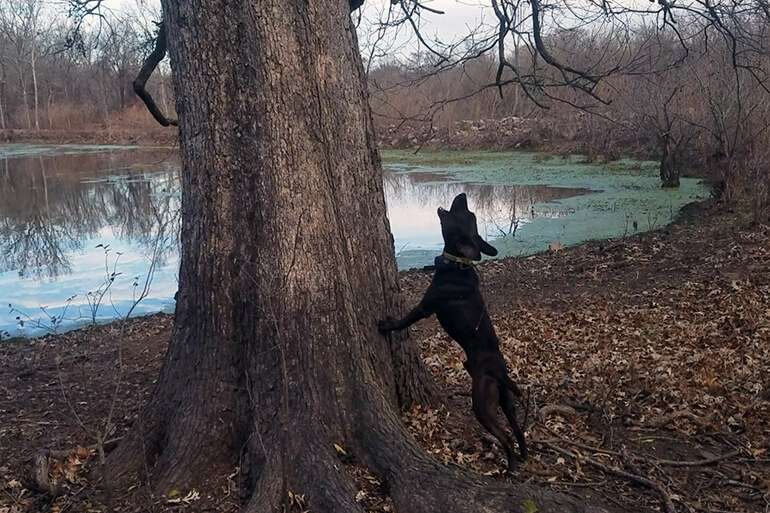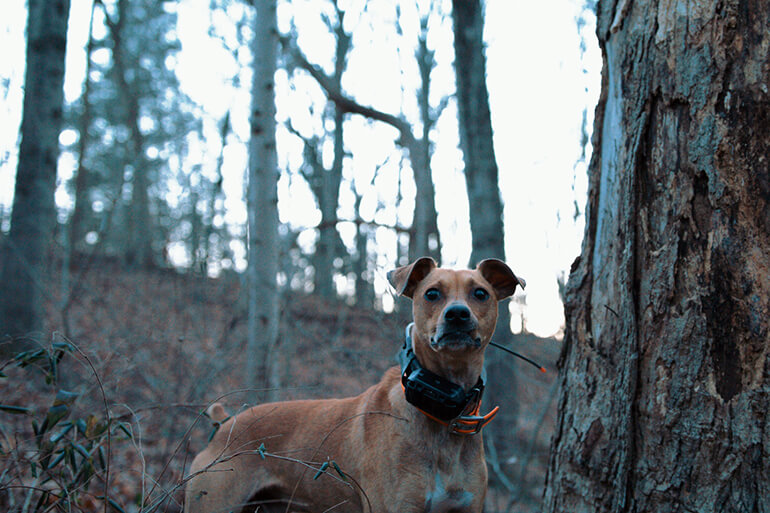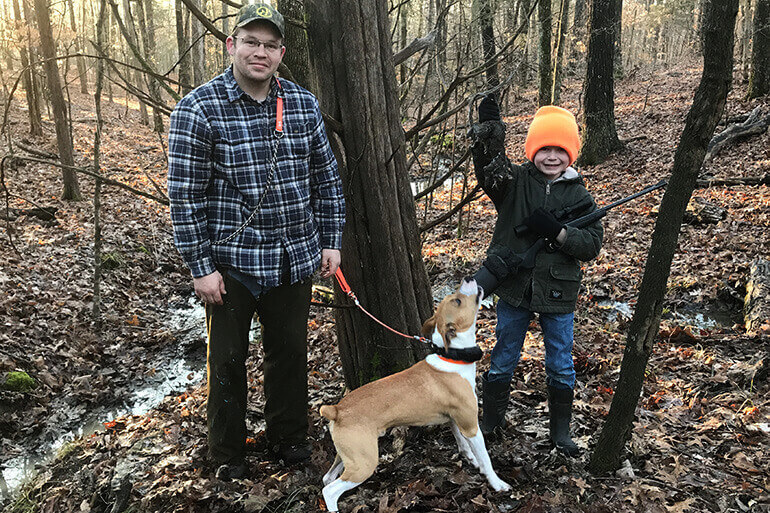
The feist simply will not give up, going from tree to tree to announce its finds. (Vowels add up to ‘ice,’ BTW.)
When you hunt with a feist, you’re carrying forward a unique American hunting tradition that most small game hunters either have forgotten or never knew.
These small treeing dogs—excellent companions of Florida squirrel hunters—are a uniquely American breed, developed over more than two centuries. One of the earliest references to the feist was made by George Washington around 1770, who referred to it as “a small foist looking yellow cur.” Feist-type dogs have played an important role in the lives of rural Americans, especially in the South.

Today there are quite a few strains and types of feists in America, but the best known probably is the Mountain Feist. This is a terrier-type dog that was recognized by the United Kennel Club in 2015. Today’s Mountain Feist was likely developed in the rural South as a low-maintenance dog to hunt small game and eliminate vermin, and today is used mostly for hunting squirrel. The original feists often were crosses between terriers and hounds; the cross was gradually stabilized into the modern Mountain Feist. Some of the other lines and types of feists are of different histories, however, and some breeders have their own crosses and lines. Other names or types of feists include Bench Feist, Pencil Tailed Feist, Flop Eared Feist and Traditional Feist, and some breeders have their own proprietary names for their specific lines.
Today’s Mountain Feists, as standardized by the United Kennel Club, generally range from 12 to 18 inches in height and 12 to 30 pounds in weight. There’s no color standard for Mountain Feists; they can be almost any color or pattern, but albinism is a disqualifying fault in the conformation ring.

As a result of the mixed heritage of feists in general, different lines have different hunting styles; some bay while trailing a squirrel and others are silent. Most of them are good at following a squirrel that’s running through the treetops. Once they have a squirrel treed, they bark or bay to let you know where the squirrel is sitting. Although they are not retrievers, they can be trained to retrieve a squirrel after the hunter has knocked it down. A Mountain Feist or other feist dog is not as easy to find as, say, a Golden Retriever. One source of information is the Mountain Feist Squirrel Dog Kennel Directory, www.mountainfeistsquirreldog.com; another is the National Feist Breeders Association on Facebook. Kennels have such romantic-sounding names as Shadowtail Kennels, Swampmusic Mountain Feist, and Coal Mountain Kennels.
Hunting with these dogs is nothing like hunting with a traditional retrieving breed. Your retriever will bring you a squirrel you kill, but a feist will locate the squirrel in the tree tops, follow it from tree to tree, tell you where it is, and bring it back to you after you kill it. Owning one requires a commitment to the breed and to training it appropriately. These are busy little dogs that need a job, and that job is finding game for the hunter and keeping the homestead free of other small vermin.
SQUIRREL SEASON

HUNTING gray squirrel is a time-honored challenge for the new outdoors person—and many retain a lifelong passion for it. The modern fascination with wild food makes converts of many; squirrels are easy to prepare and delicious pan-fried or stewed.
Gray squirrel season on private lands in Florida this year runs Oct. 8 through Mar. 5. Daily bag limit is 12; possession limit is 24. Hunting of fox squirrel is prohibited.
The state’s public Wildlife Management Area (WMA) network offers numerous squirrel-hunting opportunities, but you’ll need to consult the brochures for each WMA. In October, for instance, many WMAs are open only to hunters who’ve drawn quota permits for deer. During such periods, general access would be restricted. A great many WMAs open to general (nonquota) Small Game hunting in middle November—that would be the time to take to the woods for squirrel, rabbit, quail and other game.
The use of pointing, flushing and retrieving dogs—including the feists— is generally permitted on WMAs during the Small Game and migratory bird seasons, but again, check the regs at myfwc.com for the specific area. FSPublished Florida Sportsman Magazine October 2018








































![Air gun 101: The differences between .177 & .22 – Which jobs they do best ? [Infographic]](https://airgunmaniac.com/wp-content/uploads/2020/09/g44-150x150.jpg)


